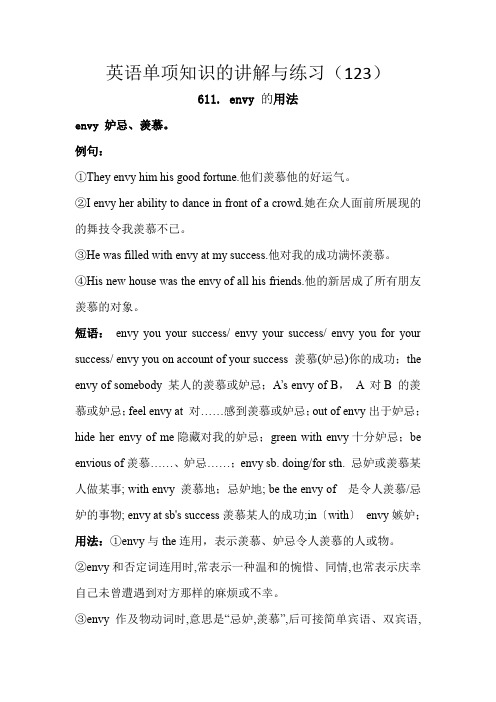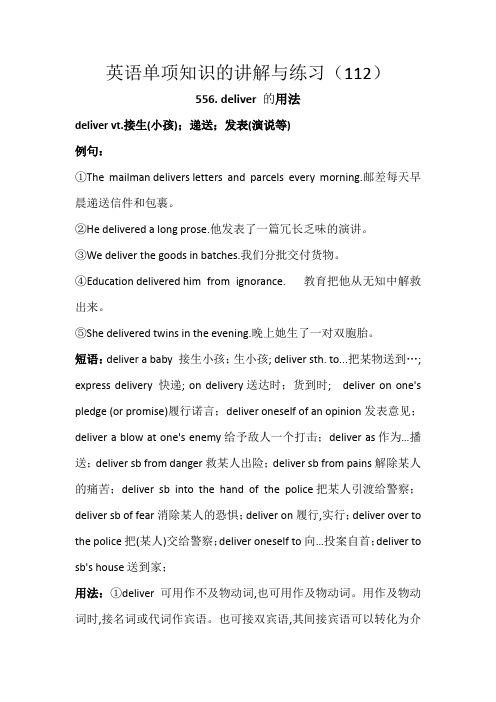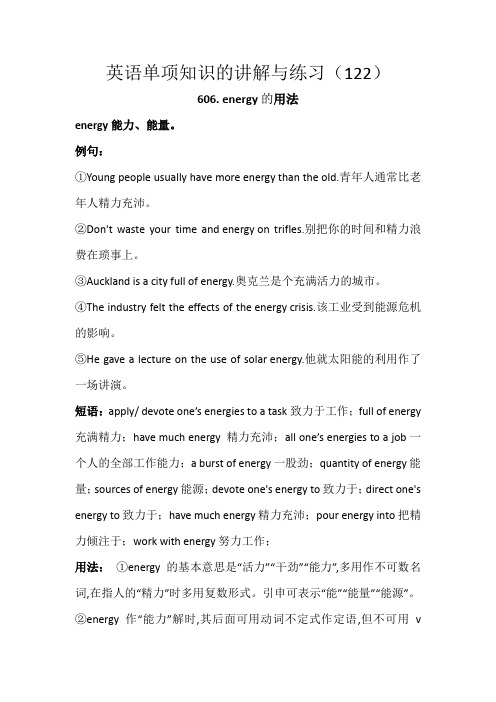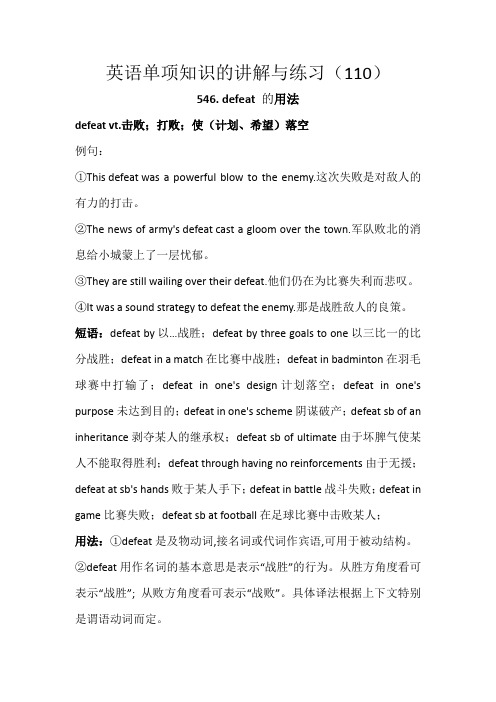英语单项知识的讲解与练习(121)
- 格式:docx
- 大小:23.83 KB
- 文档页数:10

新概念英语第一册L e s s o n-121-122练习题Lesson 121 and Lesson 122一根据句意填空(10分)1. You can look a new word up in a ______.2. I can’t remember your name. I’ve ______it.3. A ______ is a person who buys thing in a shop.4. The shop assistant ______ his buyers very well.5. The room serves ______ both bedroom and living-room.6. The lady ______ is standing behind the counter is the shop assistant.7. Dogs ______ people by their smell.8. The road is poor enough to be worth ______.9. This box is too heavy for me to ______.10. I forgot to take the umbrella ______ me.二填上一个适当的关系代词(10分)1. The dictionary ______ the gentleman bought half an hour ago was very expensive.2. The lady ______ is standing behind the counter is my sister.3. The man ______ I served was wearing a hat.4. There is only one thing ______ I can do.5. This is the boy ______ textbook was lost.6. The dog ______ is carrying the basket is mine.7. The film ______ we saw last week is good.8. He is the policeman ______ caught the thieves.9. That’s all ______ I know.10. He is the student ______ English is always at the top.三用所给词的适当形式填空(10分)1. He is the man ______ (who) I served yesterday.2. The shop keeper is standing behind the ______ (count).3. The door is open. I have forgotten ______ (open) it.4. The ______ (manage) is talking with the assistant.5. We must serve our ______ (custom) very well.6. I bought two expensive ______ (dictionary) here half an hour ago.7. I got the ______ (invite) letter yesterday.8. It is very ______ (noise) in the street.9. It happened to a friend of ______ (my) a year ago.10. You will understand me sooner or ______ (late).四用所给动词的适当形式填空(10分)1. After the thieves ______ (enter) the house, they went into the dining-room.2. They came to the party because Betty and Tom ______ (invite) them the day before last.3. The thieves ______ already ______ (go) before George went downstairs.4. Mary was doing her lessons while her brother ______ (play) games.5. This is the man whom I ______ (serve) yesterday.6. She finished her homework, then she went on ______ (do) the homework.7. When I ______ (leave) the house, the postman arrived.8. Just as I was opening the front door, the telephone ______ (ring).9. I couldn’t remember if I ______ (boil) the milk.10. She ______ (type) a letter when the boss arrived.五选择填空(15分)( ) 1. Don’t forget ______ the letter.A. postB. postingC. have postedD. to post( ) 2. The lady ______ served you last week is our assistant.A. whoB. whomC. whoseD. which( ) 3. The song ______ they are listening to is very good.A. whoB. whyC. whichD. whom( ) 4. He ______ in the army for some years.A. servedB. stayedC. leftD. remained( ) 5. He is new here. Only a few people ______ him.A. understandB. recognizeC. helpD. greet( ) 6. He ______ doing his homework by ten o’clock last night.A. finishedB. has finishedC. had finishedD. hadn’t finish( ) 7. The train ______ when I ______ to the station.A. was left; was gettingB. left; had gotC. had left; gotD. left; got( ) 8. They boy ______ watch is broke is crying.A. whoB. whoseC. whomD. which( ) 9. This is the best film ______ I have ______ seen.A. which, everB. that, everC. that, neverD. which, yet( ) 10. The members of the family ______ a bike to ride.A. each hasB. each haveC. has eachD. have each( ) 11. Everyone wants to know ______ last night.A. what was happened to himB. what happened about himC. what was happened about himD. what happened to him( ) 12. I was reading the book ______ Lily bought last week.A. whichB. whoC. whatD. where( ) 13. This is the most beautiful park ______ I have even visited.A. whichB. whoC. thatD. where( ) 14. I have told everything ______ I can to you.A. whatB. thatC. whichD. who( ) 15. Is the late beautiful? This photo will show you ______.A. how does it look likeB. what does it look likeC. how it looks likeD. what it looks like六句型转换(10分)1. I want to buy the books. They are on the counter.(把句子改写成定语从句)I want to buy the books ______ ______ on the counter.2. The woman is standing behind the counter. She served me.(把句子改写成定语从句)The woman ______ ______ standing behind the counter served me.3. The boy is clever. His eyes are big.(把句子改写成定语从句)The boy ______ ______ are big is clever.4. He is the man. I met him yesterday.(把句子改写成定语从句)He is the man ______ I ______ yesterday.5. This is the best film. I have ever seen it. (把句子改写成定语从句)This is the best film ______ I have ______ seen.6. She served tea and bread to us.(变为同义句)She ______ us ______ tea and bread.7. I forgot to take the two dictionaries with me.(就换线部分提问)______ ______ you forget to ______?8. The books which are on the counter belong to the gentleman.(就换线部分提问)______ ______ belong to the gentleman?9. He had changed so much. I couldn’t recognize him.(变为同义句)He had changed ______ much for me to ______.10. He had something that was important to do that day.(改为同义句) He had ______ ______ to do that day.七根据汉语提示完成句子(10分)1. 他就是我昨天接待的顾客。

英语单项知识的讲解与练习(123)611. envy 的用法envy 妒忌、羡慕。
例句:①They envy him his good fortune.他们羡慕他的好运气。
②I envy her ability to dance in front of a crowd.她在众人面前所展现的的舞技令我羡慕不已。
③He was filled with envy at my success.他对我的成功满怀羡慕。
④His new house was the envy of all his friends.他的新居成了所有朋友羡慕的对象。
短语:envy you your success/ envy your success/ envy you for your success/ envy you on account of your success 羡慕(妒忌)你的成功;the envy of somebody 某人的羡慕或妒忌;A’s envy of B,A 对B 的羡慕或妒忌;feel envy at 对……感到羡慕或妒忌;out of envy出于妒忌;hide her envy of me隐藏对我的妒忌;green with envy十分妒忌;be envious of羡慕……、妒忌……;envy sb. doing/for sth. 忌妒或羡慕某人做某事; with envy 羡慕地;忌妒地; be the envy of 是令人羡慕/忌妒的事物; envy at sb's success 羡慕某人的成功;in〔with〕envy 嫉妒;用法:①envy与the连用,表示羡慕、妒忌令人羡慕的人或物。
②envy和否定词连用时,常表示一种温和的惋惜、同情,也常表示庆幸自己未曾遭遇到对方那样的麻烦或不幸。
③envy作及物动词时,意思是“忌妒,羡慕”,后可接简单宾语、双宾语,也可以在宾语后接for加动名词等结构,但不能接从句。

英语单项知识的讲解与练习(112)556. deliver的用法delivervt.接生(小孩);递送;发表(演说等)例句:①The mailman delivers letters and parcels every morning.邮差每天早晨递送信件和包裹。
②He delivered a long prose.他发表了一篇冗长乏味的演讲。
③We deliver the goods in batches.我们分批交付货物。
④Education delivered him from ignorance.教育把他从无知中解救出来。
⑤She delivered twins in the evening.晚上她生了一对双胞胎。
短语:deliver a baby 接生小孩;生小孩; deliver sth. to...把某物送到…; express delivery 快递; on delivery送达时;货到时; deliver on one's pledge (or promise)履行诺言;deliver oneself of an opinion发表意见;deliver a blow at one's enemy给予敌人一个打击;deliver as 作为…播送;deliver sb from danger 救某人出险;deliver sb from pains 解除某人的痛苦;deliver sb into the hand of the police 把某人引渡给警察;deliver sb of fear 消除某人的恐惧;deliver on 履行,实行;deliver over to the police 把(某人)交给警察;deliver oneself to 向…投案自首;deliver to sb's house 送到家;用法:①deliver可用作不及物动词,也可用作及物动词。

(完满word版)人教版七年级下册英语1单元知识点总结及练习题,介绍文档一、词汇拓展(1〕 teach v教.;解说→ teacher n.教师(2〕 write v.写作;写→ writer n.作者;作家(3〕 sing v.唱,唱歌→ singer n.歌手,歌星(4〕 music n.音乐→ musician n.音乐家(5〕 violin n. 小提琴→ violinist n. 小提琴手(6〕 piano n.钢琴→ pianist n.钢琴家二、短语〔 1〕art club艺术俱乐部〔2〕swimming club游泳俱乐部(3〕 do Chinese kung fu 练中国功夫(4〕 English-speaking student 讲英语的学生 P〔 5〕 play the piano 弹钢琴〔6〕play the drums敲鼓〔 7〕 play sports 进行体育运动〔8〕play basketball打篮球(9〕 play computer games 玩电子游戏〔10〕 play chess 下国际象棋(11〕make friends with sb.与某人交朋友〔 12〕talk to sb.与某人说话〔 13〕speak English 讲英语〔14〕tell stories讲故事(15〕have time 有空;有时间同 be free(16〕gelp sb.wath sth.帮助某人做某事,〔 17〕learn about 学习方面的知识〔18〕call sb.at..打〔〕给 ......〔 19〕be good with sb.与某人相处得好〔 20〕a little 一点点;少量的〔 21〕at the old people's home在敬老院〔22〕 on Sunday在星期天,〔 23〕on weekends在周末〔24〕after school 在放学后〔 25〕be busy doing 忙于做某事be busy with sth. 忙于某事(26〕what about / how about doing sth. 做怎么样〔 27〕be good with sb.和某人相处好be good to sb.对某人友好for sb./ sth. 对有益〔有好处〕be good at (doing) sth. 擅长 (做)某事be good三、知识点play 的用法(1)西洋乐器名词前必定加 theplay the piano 弹钢琴play the guitar 弹吉他play the violin 拉小提琴play the drums 敲鼓(2) 语言、学科、三餐饭、球类名词前不加Play basketball 打篮球Play football 踢足球【拓展】 play chess 下棋play cards 打牌the。

英语单项知识的讲解与练习(122)606. energy的用法energy能力、能量。
例句:①Young people usually have more energy than the old.青年人通常比老年人精力充沛。
②Don't waste your time and energy on trifles.别把你的时间和精力浪费在琐事上。
③Auckland is a city full of energy.奥克兰是个充满活力的城市。
④The industry felt the effects of the energy crisis.该工业受到能源危机的影响。
⑤He gave a lecture on the use of solar energy.他就太阳能的利用作了一场讲演。
短语:apply/ devote one’s energies to a task致力于工作;full of energy 充满精力;have much energy 精力充沛;all one’s energies to a job一个人的全部工作能力;a burst of energy 一股劲;quantity of energy 能量;sources of energy 能源;devote one's energy to 致力于;direct one's energy to 致力于;have much energy 精力充沛;pour energy into 把精力倾注于;work with energy 努力工作;用法:①energy的基本意思是“活力”“干劲”“能力”,多用作不可数名词,在指人的“精力”时多用复数形式。
引申可表示“能”“能量”“能源”。
②energy作“能力”解时,其后面可用动词不定式作定语,但不可用v-ing形式。
比较:energy 能、能量,是物理学名词,用于人时,指生理上的精力,用来做某事或完成某事的能力,以及自然界的能量。

英语单项知识的讲解与练习(110)546. defeat的用法defeatvt.击败;打败;使(计划、希望)落空例句:①This defeat was a powerful blow to the enemy.这次失败是对敌人的有力的打击。
②The news of army's defeat cast a gloom over the town.军队败北的消息给小城蒙上了一层忧郁。
③They are still wailing over their defeat.他们仍在为比赛失利而悲叹。
④It was a sound strategy to defeat the enemy.那是战胜敌人的良策。
短语:defeat by 以…战胜;defeat by three goals to one 以三比一的比分战胜;defeat in a match 在比赛中战胜;defeat in badminton 在羽毛球赛中打输了;defeat in one's design 计划落空;defeat in one's purpose 未达到目的;defeat in one's scheme 阴谋破产;defeat sb of an inheritance 剥夺某人的继承权;defeat sb of ultimate 由于坏脾气使某人不能取得胜利;defeat through having no reinforcements 由于无援;defeat at sb's hands 败于某人手下;defeat in battle 战斗失败;defeat in game 比赛失败;defeat sb at football 在足球比赛中击败某人;用法:①defeat是及物动词,接名词或代词作宾语,可用于被动结构。
②defeat用作名词的基本意思是表示“战胜”的行为。
从胜方角度看可表示“战胜”; 从败方角度看可表示“战败”。
英语单项知识的讲解与练习(29)141、no matter how hard it isno matter how ...引导让步状语从句,意为“无论多么……”,how 后跟形容词或副词,相当于“however + adj./adv.”句式。
no matter意为“无论;不管”时,引导让步状语从句,常用于下列句型中:no matter what (who/when etc. )... 分别表示“无论何事”、“无论何人”、“无论何时”等,这个从句可以置于主句之前,也可以置于主句之后。
no matter后接关系代词或关系副词引导的状语从句在句中作让步状语。
no matter what (who, which, where, when … )只能引导让步状语从句;whatever (whoever, whichever, whomever)既可引导让步状语从句,也可引导名词性从句。
no matter 引导的分句表达的是将来的含义,但形式上要用现在时。
如:No matter who will come (改为:comes);no matter 引导的分句不能作宾语或主语。
如:I’ll eat no matter what (改为:whatever) you give me;whichever意为“无论哪个;无论哪些”;whatever意为“无论什么;凡是……的事物”。
whichever可以引导名词性从句或让步状语从句,which是个疑问词;用在疑问句中,或作关系代词,引导定语从句。
no matter which只能引导让步状语从句;而whichever可引导让步状语从句和名词从句。
no matter which可以用whichever代替,但两个同时出现在选项中时,必须选whichever。
练习:①No matter ___ he said, I don’t like him.A. whatB. howC. thatD. why②No matter ___ you go, I will go with you.A. whatB. whichC. whereD. that③That student is discourteous; he complains ___ one tries to please him.A. howeverB. whateverC. no matter whatD. no matter how④_____ the problem may be, we must solve it ourselves.A. Whatever difficultB. How difficultC. However difficultD. No matter what difficult⑤It is generally considered unwise to give a child _____ he or she wants.A. howeverB. whateverC. whicheverD. whenever⑥We’ll eat at _____ restaurant has a free table.A. whichB. whateverC. whicheverD. no matter which⑦These wild flowers are so special that I would_____ do I can to save them.A. whateverB. thatC. whichD. whichever142、mind doing something(1)、mind doing something 通常用于疑问句、否定句和条件句等结构中,这个结构前还可加所有格定语。
英语单项知识的讲解与练习(120)596. earn的用法earnvt. 赚;挣得;获利;赢得;获得例句:①He has earned a lot of money in this month.这个月他已经赚了好多钱了。
②He works hard, but he does not earn much money.他工作很努力,但钱赚得不多。
③How does she earn her living?她靠什么谋生?④His skill in negotiating earned him a reputation as a shrewd tactician.他的谈判技巧使他赢得了精明战略家的名声。
⑤It has taken years to earn their trust.花了好多年才赢得他们的信任。
短语:earn one’s living=make a living 谋生; earn money= make money 挣钱; earn a good reputation 赢得一个好名声; earn sb. sth赢得某人某物;earn by 用…博得;earn by hard labour 靠辛勤劳动挣来的;earn by sweat and toil 靠血汗而挣得的;earn for sb 为某人博得;earn with 用…挣得;用法:①earn可用作及物动词,也可用作不及物动词。
用作及物动词时接名词或代词作宾语。
②earn作“使得到,使赢得”解时,其后还可跟双宾语,其间接宾语也可转化为介词for的宾语。
辨析: earn 侧重指依靠自己的劳动或因付出代价,有功而获得。
obtain 着重指通过巨大努力、要求得到所需或盼望已久的东西。
acquire书面用语,强调通过不断地、持续地努力而获得某物,也指日积月累地获得。
get一般用语,使用较广。
可指以任何方式得到某物,也不一定要经过努力。
gain侧重指经过努力或有意识的行动而取得某种成就,或指获得某种利益或好处。
英语单项知识的讲解与练习(100)496. conclusion的用法conclusion结束、结论、推论。
例句:①I found the conclusion of her story very exciting.我觉得她那故事的结尾很激动人心。
②Some found the conclusion of the film Titanic very disappointing.有些人觉得电影《泰坦尼克号》的结尾是令人失望的.③Your information is inaccurate and your conclusion is therefore wrong.你的信息不准确,所以你的结论是错误的。
④So far no correct conclusion has arrived at.到目前为止,还没有得出任何正确的结论。
短语:in conclusion 在结束时、最后;try conclusions with 和……决胜负;arrive at/ come to/ draw/ reach a conclusion得出结论;accept sb's conclusion 同意某人的结论;seek a conclusion to sth 设法了结某事;correct conclusion 正确的结论;painful conclusion 痛苦的结局;at the conclusion 在结尾;on the conclusion of the course课程结束时;conclusion of a book一本书的结尾;练习:(1). 单项填空:①Scientists have made a great ___ in the treatment of cancer.A. principleB. breakthroughC. conclusionD. introduction②___, I’d like to say how much I’ve enjoyed staying in your beautiful country.A. To concludeB. To be concludedC. In the conclusionD. As conclusion③After talking with him for a few minutes I ___ the conclusion that he was not fit for our work.A. went toB. came toC. turned toD. referred to④I’ve ____ the conclusion that he’s not the right person for the job.A. got toB. gone toC. come toD. arrived to(2). 完成句子:①我断定他不适合做这项工作。
英语单项知识的讲解与练习(121)601. effect的用法effect效果、作用。
例句:①The aspirins soon took effect.服下的阿司匹林药片很快见效了。
②The advertising campaign didn't have much effect on sales.这些广告攻势对销售额并没有起到多大作用。
③Doctors cannot effect a cure if the disease has spread too far.假如这种疾病已扩散得厉害,医生也无法妙手回春。
④The temperature often effects a change of the state of matter.温度常常引起物态的变化。
短语:in effect 实际上、事实上;be of no effect/ without effect 无效;be in/ come/ go into effect生效、实行、实施;have an effect on=have an influence on=have an impact on 对……有影响; put/bring/carry ...into effect 付诸实施; take effect生效;奏效; come into effect 开始实施;开始生效; effect a settlement of a dispute解决争端;effect an insurance policy取得保险单;effect reforms 实行改革;effect the greatest economy力求节约;effect of time for news新闻时效性;effect on对…有效果;用法:①effect作“结果,影响”“感受,印象”等解时,既可用作可数名词,也可用作不可数名词; 作“个人财产,财物”解时常用复数形式。
②effect一般用作及物动词,表示“引起”“实现”“使生效”,接名词或代词作宾语。
可用于被动结构。
练习:①When the first radio messages from the astronaut in the spaceship have been received, the ___ of the trip to outer space will be announced immediately.A. causesB. effectsC. resultsD. conclusion②It is thought that oversleep has a bad ___ on one’s health.A. effortB. effectC. benefitD. disadvantage③Punishment had very little ___ on him.A. an effectB. effectC. effectsD. effort④The new rule was ___ at once the moment it was made.A. put into effectB. brought into effectC. carried into effectD. all the above⑤Punishment had very little ___ on him.A. affectB. effortC. effectD. effects⑥The conference had been held to discuss the effects of tourism ___ the wildlife in the area.A. inB. onC. atD. with⑦The new law will come into ___ on the day it is passed.A. effectB. useC. serviceD. existence602. effort的用法effort努力、艰难的尝试。
例句:①They are making every effort to decrease the production cost.他们正尽力减少生产成本。
②All my efforts were fruitless.我所有的努力都白费了。
③It doesn't need much effort. 那不需要太多的精力。
④His effort to reform her at length succeeded. 他要改造她的努力最终成功了。
⑤This is his effort at depicting the peasants. 这是他描写农民的作品。
短语:make an effort/ make efforts (不用:the) to do something/ on something努力;spare no efforts 不遗余力;without effort 毫不费力地;put effort into something/ doing something致力于、在某事上下功夫;after one's effort 经过努力后;by one's efforts 靠努力;with effort 费力地;用法:①effort的基本意思是“力气”“努力”,指做某事所使用的力气和努力,作此解时只用作单数形式,引申表示“努力”“奋斗”,指费力做某事或艰苦的尝试,作此解时是可数名词。
②effort还可表示“努力的事例”“努力的成果”,即“作品”“成就”,为可数名词。
③effort表示“努力”时,其后可接动词不定式作其定语,偶尔也可接介词短语作定语。
④effort指“努力”时,后面跟不定式。
如:His effort to reform her at length succeeded.他为改变她作出努力最后取得了成功。
⑤effort指“作品”时,后面跟at和动名词或名词。
如:This is his effort at depicting the peasants.这是他描绘农民的一幅作品。
⑥effort指“努力”时,是抽象名词,不可直接用于make后。
只能以an effort,efforts,every efforts等形式出现;练习:①I’ll ___ to make up for the lost time.A. make a good effortB. make every effortC. make effortsD. all the above②The boy has much strength. He can lift the rock without ___.A. effectB. effortC. affordD. affect③To the joy of his parents, the boy was ___ to achieve his goal.A. making every effortsB. making all effortC. made an effortD. sparing no effort④Please go on trying. I’m sure the efforts you are ___ will pay off.A. doingB. givingC. makingD. sparing603. end的用法end末尾、终点、结束。
例句:①The battle finally brought the war to an end.这一仗使这场战争终告结束。
②At the end of the film, the hero wept bitterly.在影片的结尾,主人公伤心地哭了。
③The debate ended in uproar.那场争辩以大吵大闹收场。
④They ended the party off with a song.他们唱支歌结束了晚会。
短语:end up with something以……结束;the ends of the earth天涯海角;to that end为了那个目的;to the end到底;about to end即将告终;make ends meet = make both/ two ends meet使收支相抵、量入为出;at an end完毕了、结束了(作表语);come to an end 结束;save money to this end为这个目的存钱;an end to war战争的结束;end of one's work工作结束;end of the world天涯海角,天南地北;end of the year年底;end to end两头相接,衔接,不断地;用法:①end既可用作及物动词,也可用作不及物动词,在用作不及物动词时,常常与介词或副词构成短语; 用作及物动词时,通常接名词或代词作宾语。
可用于被动结构。
②end后常可接副词以加强语气。
end up后可接“as+名词”、形容词、现在分词、过去分词和介词短语。
③end还可作“目的”解,是可数名词,说“达到目的”时常可与accomplish, achieve, attain, compass, gain, obtain, reach, secure, win等动词连用。
end作“结局”“结果”解时可加不定冠词。
④end up (in a job) 最后(做某事)、终于(成为),含有最终结局不好之意;up可省,后接with,强调用工具结束;后接in,强调用某种状态结束。
如:If you drive your car like that, you’ll end up in hospital. 后接as,指用怎样的身份结束。
如:He ended up as manager of the firm. 比较:at the end of 在……的最后(结尾)、在……尽头(末端),表示具体或抽象时间、地点的端点,常与过去式或将来式连用,后可接时间的点或段。
如:At the end of the term we shall have another exam.at the end 可作表语,意为“完毕了、结束了”。
如:The war is at the end.by the end of 截止到……、到……末为止,常与完成时连用。
如:By the end of last term we had learned a thousand new words.in the end 最后、终于,表示经过许多变化、困难和捉摸不定的情况后某事才发生。